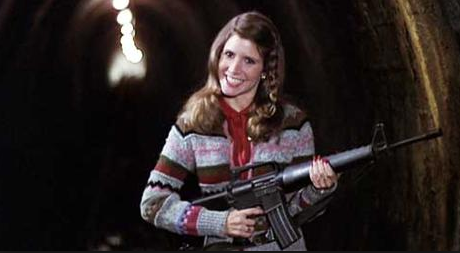Carrie Fisher. Princess Leia. You can’t say one without thinking the other. And yet, there is so much more to Fisher’s career than this role. Her literary propensities began early on and stemmed from a life of escaping into books (somewhere after the time her father, Eddie Fisher, left her mother, Debbie Reynolds, for Elizabeth Taylor and Reynolds subsequently married a shoe salesman who subtly stole all her money). And yet, ironically, circumstances continuously conspired to keep Fisher out of maintaining or completing her formal education. Upon getting her first acting role in 1973’s Broadway production of Irene, which also starred her mother, Fisher dropped out of Beverly Hills High and subsequently never finished high school. Nonetheless, a year and a half spent at London’s Central School of Speech and Drama managed to land her acceptance into Sarah Lawrence College. Still again, circumstances conspired against her education when Fisher realized that the filming schedule of Star Wars would conflict with her admittance. And when one is presented with the choice of going to Sarah Lawrence or being the star of a movie, the decision is fairly clear.
Become a star she did–an icon, in fact, thanks to those (hair) buns. Her daughter, Billie Lourd, would even go on to pay tribute to this endlessly reused and repackaged hairstyle by perpetually wearing earmuffs for her role as Chanel #3 on Scream Queens. But well before Star Wars: Episode IV – A New Hope, there was her standout role in Hal Ashby’s Shampoo as Lorna, the daughter of Felicia Karpf (Lee Grant), a wealthy married woman George Roundy (Warren Beatty) seduces for the purpose of getting money to open up his own salon. Her Lolita-like moves on the tennis court and the line, “I’m nothing like my mother,” made it evident to see she was destined for silver screen greatness.
In the wake of and in between Star Wars, there was an affair with Harrison Ford, choking on a Brussels sprout in Chicago while on location for The Blues Brothers that prompted Dan Aykroyd to give her the Heimlich maneuver and, oh yes, drug addiction. And perhaps more than any portrayal, her interpretation of “Mystery Woman” in The Blues Brothers is her best beyond the realm of Star Wars. Making a statement on the caricature of the crazy bitch long before the archetype had been named, Fisher brings hilarity with nary a word to stalking Jake (John Belushi), the man who jilted her and left her behind without an explanation.
It was The Blues Brothers that firmly solidified her knack for scene-stealing in seemingly small parts that felt big only when seeing her inhabit them, as she did in Woody Allen’s 1986 film, Hannah and Her Sisters. As April, a cater waiter who works with Holly (Dianne Wiest), and attracts the attention of David (Sam Waterston), Fisher delivers each line with her distinct poignancy and wit. As David shows her the architecture of the city (it’s a Woody Allen movie, such pretentiousness is to be expected), he reminds her, “April, people pass by vital structures all the time.” She returns, “They never appreciate them,” almost as though she’s talking about herself.
A year after Hannah and her Sisters, in 1987, Fisher at last applied her vast knowledge of literature to her own work, writing her debut autobiographical novel, Postcards From the Edge, later adapted into the 1990 film of the same name starring Meryl Streep and Shirley MacLaine. This would be one of the first publicly demarcated moments when Fisher was able to showcase her singular humor and knack for writing. Her behind-the-scenes contributions to screenplay rewrites for Hook, Lethal Weapon 3, So I Married an Axe Murderer and the magical but underrated The Mirror Has Two Faces, among many others, proved time and time again her talent for story structure and dialogue.
Fisher expanded her novel arsenal with Surrender the Pink and Delusions of Grandma as the 90s wore on. Elsewhere in her late 90s/early 00s career, Fisher mastered the art of self-parody with her cameos, particularly as herself on Sex and the City and as out-of-work, delusional TV writer Rosemary Howard on 30 Rock. And let us not forget that she was the end all, be all reason for watching When Harry Met Sally, showing off her natural gift for aphorisms with quips such as, “Restaurants are to people in the 80s what theaters were to people in the 60s. I read that in a magazine,” and “The point is, he just spent $120 on a new nightgown for his wife. I don’t think he’s ever gonna leave her.”
While, to many, it is sacrilegious, nay, anti-American–even anti-life–to say that Princess Leia was the least of her iconography, of what she was intellectually and artistically capable of, Fisher’s multi-faceted vocational talents go far beyond wearing a gold bikini.





















